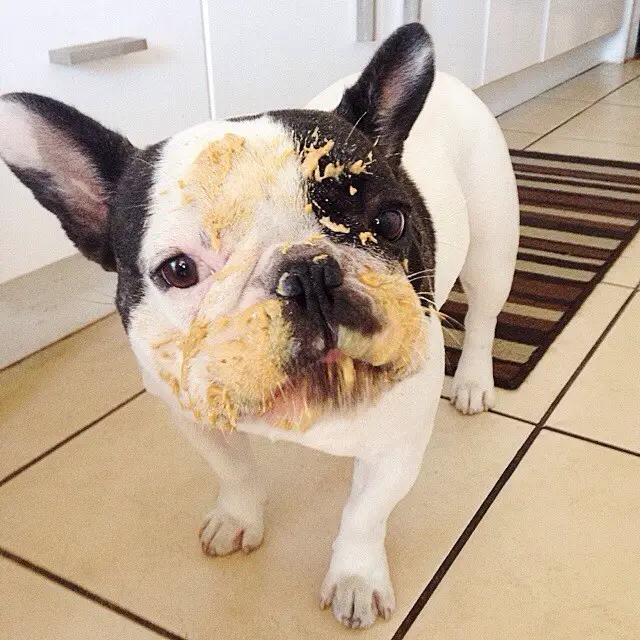Humans love to eat peanuts. They are very delicious and contain lots of beneficial nutrients. But can a dog eat peanuts without any danger? The answer is yes! Dogs can eat peanuts, and they will surely love it. If you regularly feed your pooch with peanuts, then read on for more info about taste treat. We have prepared essential information about peanuts. Read on to know more about these tasty treats.
Are Peanuts Good for Your Dogs?
Peanuts are a legume crop with edible seeds. It is a native to the tropics and sub-tropics where it grows abundantly. Humans love peanuts as food, and it is safe for dogs as well. When given moderately, peanuts are a good source of nutrients for your canine buddy. Peanut contains several nutrients that beneficial for your pet. These are:
- Protein – It essential for your pet’s overall health. It ensures that your dog’s coat will not become brittle and fall off. Shredding can leave bare and darkened patches on their skin. Proteins can help prevent this from happening and help keep their color looking beautiful. Also, protein strengthens their natural response to infections and heals wounds quickly. Lack of protein may lead to sick pets. Also, dogs may develop wounds that don’t heal fast.
- Vitamin B Complex – Vitamin B complex turns carbohydrates into glucose to provide energy for your pet. It helps in fat and protein absorption and prevents various health conditions. If your pooch lacks this nutrient, they may have excessive shedding, allergy to fleas, and decaying teeth. Likewise, they are prone to having high cholesterol levels, weight gain, anxiety, and stress. Canines with regular motion sickness, constipation, and an adverse reaction to vaccines may also be deficient in Vitamin B Complex.
- Niacin (Vitamin B3) – Niacin or Vitamin B3 is a water-soluble vitamin. It helps metabolizes amino acid, glucose, fatty acid, and ketone. It reduces the severity of hypercholesterolemia and VLDL synthesis in obese pets. Lack of niacin in dogs can lead to anorexia and diarrhea with bloody stool. Some pets may also lose weight, have ptyalism and erythema of the oral mucosa. Additionally, niacin deficiency in canines can cause ulcerations, inflammation. In extreme cases, it can lead to death.
These three nutrients play a significant role in keeping your dog healthy, happy, and fit. A healthy dog saves you a lot of money since there will be fewer trips to the vet.
The Good and Bad Benefits of Peanuts to Dogs
Peanuts, like other foods, have specific beneficial and detrimental effects on your pet’s health. You must know the pros and cons of giving peanuts since it will affect your dog in the long-run. Knowing which are good and which are not will also help you plan and manage your pet’s diet. Consequently, peanuts can be a great treat. But giving your pets more of it might lead to serious health consequences.
Good
- Prevents the coat of your dog from becoming brittle and premature graying.
- Stops your dog’s hair from falling in patches and shedding.
- It enhances the dog’s resistance to various infections.
- It strengthens the canine’s natural healing process.
- Peanuts prevent the dog’s skin from darkening.
- It helps in protein and fat absorption.
- Protects the dog’s teeth from cavities and premature decaying.
- It mitigates excessive weight gain, motion sickness, and anxiety stress.
- Stop allergies that are caused by fleas.
- It aids in metabolizing amino acid, glucose, fatty acid, and ketones.
- Reduces the severity of hypercholesterolemia and VLDL synthesis in obese dogs.
- Prevents unhealthy weight loss, bloody diarrhea, and anorexia.
- Stops oral mucosa erythema, ulceration and inflammation.
Bad
- A buildup of this sugar substitute can lead to Xylitol toxicity.
- Accumulation of salt in your pet’s body can lead to salt poisoning.
- Excessive amounts of peanut can result in pancreatitis.
- Upset stomach
- Diarrhea
- Vomiting
What Types Of Peanuts Can I Feed My Dogs?
Feeding your dog peanuts is a good idea, but can a dog eat all types of peanuts? Peanuts are generally safe for dogs. But depending on how they are cooked or prepared, peanuts can cause unhealthy canine conditions.
The best kind of peanut to feed your pet is the unsalted, raw, and dry-roasted types. Almost all veterinarians agree that this type of peanuts is the safest for your pet. Also, unsalted, raw, and dry-roasted peanuts are the most nutritious.
Avoid salted peanuts, honey roasted, flavored, and peanut treats. Salted peanuts are high in sodium. Giving too much of this to your pet can lead to salt ion toxicity.
Honey roasted and flavored peanuts are unsafe treats for pets. These products also contain various chemicals. Peanut treats such as candy bars and chocolate are for humans only. These products have certain ingredients that are poison for dogs. Therefore, these treats must be off-limits from your canine buddies.
Lastly, remove all the shells from raw and dry-roasted peanuts before giving them to your pooch. These shells are choking hazards, and it can be fatal. Therefore, removing the peanut shell is worth the safety of your precious dog.
How Many Peanuts Can I Give To My Dogs?
There is no specific or set amount of peanuts you can give your dog. People say that moderation is the key to feeding your pooch, and this includes peanuts.
You should limit your pet’s peanut consumption to just a few pieces. Please bear in mind that peanuts are treats. Therefore, it should not be given every day.
If you love your dog dearly, give them appropriate portions when it comes to peanuts and other types of treats. Avoid giving peanuts regularly to prevent any adverse health consequences. Likewise, you should also avoid giving meals with peanuts as the main ingredient. Keep in mind that giving these kinds of meals daily also means that you are feeding them peanuts every day.
Peanut butter is a paste made from crushed roast peanuts. Peanut butter is a personal favorite spread. Likewise, it is a delicious ingredient for recipes due to their distinctive properties. Pet parents are always tempted to share this tasty peanut product with their pooch. But can dogs eat peanut butter?
Peanut butter is a delicious treat for dogs. Unfortunately, it has ingredients that may negatively impact your canine’s health. All peanut butter contains oil, sodium, sugar substitute, and other unhealthy components.
Oily fats are useful for your dog in small quantities. On the other hand, excessive oil consumption can be harmful to them. Sodium found in salt can cause ion toxicosis in your pet. Peanut butter and salted peanut products use high amounts of sodium; therefore, they must be avoided. Additionally, most peanut butter products use sugar substitute (Xylitol), which is highly toxic to dogs.
Peanut butter brands like P-28 Foods and Krush Nutrition contain xylitol. If you gave too much peanut butter to your pet, watch out for symptoms of xylitol toxicity. These include seizures, panting, disorientation, and staggering.
Below are some of the ingredients in peanut butter that can harm your pet:
- Aflatoxins – This ingredient is a type of mycotoxins. The Aspergillus fungus usually produces it. Aflatoxin is a carcinogenic substance that can cause cancer to humans and dogs. Likewise, it can cause liver cancer in canines due to the toxicity of the substance towards their liver.
- Trans-fatty acids (Trans-fats) – Trans-fats are useful in preserving foods, so they last a long time. Unfortunately, significant amounts of trans-fats can be toxic to humans or dogs. Trans-fats and hydrogenated oils are known to cause various health hazards. For instance, it causes chronic inflammation, diabetes, and heart disease in your pet.
- Sugar – We humans use sugar as a sweetener or ingredient in some of our diets. However, too much sugar can be harmful to us. The same effect applies to dogs too. Excessive sugar intake can cause low-level inflammation, food allergies, premature aging, and diabetes. Studies also reveal that sugars feed cancer cells in dogs. Thus, sugar consumption should be moderated for both humans and canines.
- Xylitol –This substance is a sugar substitute common in commercial peanut butter. Xylitol is either a naturally occurring substance or a chemical sugar alcohol. You can find natural xylitol in lettuce, berries, and mushrooms. On the other hand, commercial xylitol comes from vegetable material such as corn fiber and hardwood trees. It has the look and taste of sugar. For dogs, small amounts of xylitol can lead to liver failure, hypoglycemia, or in worse cases, death.
Go For Homemade Peanut Butter Instead!
Although peanut and peanut products are excellent food for canines, pet parents are advised to check their ingredients. Avoid products with high sodium content, sugary, and trans-fat. Likewise, watch out for “natural sweeteners” as it is another name for xylitol. This ingredient is toxic for all dog breeds.
On the other hand, you can give your fur babies safe peanut products. You can prepare non-commercial homemade type roasted peanuts or peanut butter that both of you can enjoy.
When you prepare these foods, you can skip oil or sodium to make a healthier version. Likewise, since it is homemade, your peanut butter will not have any toxic and unhealthy ingredients. It won’t have trans-fat, aflatoxin, hydrogenated oils, and xylitol.
If you have the skills to make homemade peanut butter, then do so. It is a healthy alternative to commercial peanut butter. It allows you to control or skip the oil and sodium in your peanut butter. If you can’t make homemade peanut butter, find someone who can do it for you.
There you have it, the ins and outs of peanuts. Now you know the pros and cons of giving peanuts your dog. It may be a great treat to give your pets, keep in mind to practice moderation. If possible, choose homemade peanut products. This way, you avoid giving your pets any products with harmful ingredients.
READ MORE:
- CAN DOGS EAT APPLE?
- CAN DOGS EAT COCONUT?
- CAN DOGS EAT WATERMELON?
- CAN DOGS EAT PINEAPPLE?
- CAN DOGS EAT MUSHROOM?
- VEGETABLES BAD FOR DOGS



